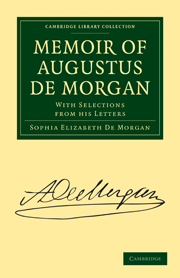Book contents
- Frontmatter
- PREFACE
- Contents
- SECTION I FROM 1806 TO 1827
- SECTION II FROM 1827 TO 1831
- SECTION III FROM 1831 TO 1836
- SECTION IV CORRESPONDENCE FROM 1831 TO 1836
- SECTION V FROM 1836 TO 1846
- SECTION VI CORRESPONDENCE FROM 1836 TO 1846
- SECTION VII FROM 1846 TO 1855
- SECTION VIII CORRESPONDENCE FROM 1846 TO 1855
- SECTION IX FROM 1856 TO 1865
- SECTION X CORRESPONDENCE FROM 1856 TO 1866
- SECTION XI FROM 1866 TO 1871
- SECTION XII CORRESPONDENCE FROM 1867 TO 1870
- LIST OF WRITINGS
- INDEX
SECTION II - FROM 1827 TO 1831
Published online by Cambridge University Press: 29 August 2010
- Frontmatter
- PREFACE
- Contents
- SECTION I FROM 1806 TO 1827
- SECTION II FROM 1827 TO 1831
- SECTION III FROM 1831 TO 1836
- SECTION IV CORRESPONDENCE FROM 1831 TO 1836
- SECTION V FROM 1836 TO 1846
- SECTION VI CORRESPONDENCE FROM 1836 TO 1846
- SECTION VII FROM 1846 TO 1855
- SECTION VIII CORRESPONDENCE FROM 1846 TO 1855
- SECTION IX FROM 1856 TO 1865
- SECTION X CORRESPONDENCE FROM 1856 TO 1866
- SECTION XI FROM 1866 TO 1871
- SECTION XII CORRESPONDENCE FROM 1867 TO 1870
- LIST OF WRITINGS
- INDEX
Summary
1827. William Frend.
It was at this time that he became acquainted with my father, William Frend. They first met at the office of the Nautical Almanac, of which their common friend, Lieutenant Stratford, R.N., had been recently appointed Comptroller. Mr. Frend and Mr. Stratford were both members of the old Mathematical, and subsequently of the Astronomical Society. Though my father was, even at that time, far behind Mr. De Morgan as a mathematician, the two had a good deal of mathematics in common. My father had been second wrangler in a year in which the two highest were close together, and was, as his son-in-law afterwards described him, an exceedingly clear thinker and writer. It is possible, as Mr. De Morgan said, that this mental clearness and directness may have caused his mathematical heresy, the rejection of the use of negative quantities in algebraical operations; and it is probable that he thus deprived himself of an instrument of work, the use of which might have led him to greater eminence in the higher branches. This same heresy gave occasion to many amusing arguments and discussions. But between these two sympathy in matters of morals and principle formed a stronger bond than similarity of pursuit. My father had sacrificed good prospects as a clergyman to his conscientious scruples about the doctrines of the Established Church, as expressed in the Creeds and Articles, and had been through life an earnest advocate of religious liberty.
- Type
- Chapter
- Information
- Memoir of Augustus De MorganWith Selections from His Letters, pp. 19 - 40Publisher: Cambridge University PressPrint publication year: 2010First published in: 1882



